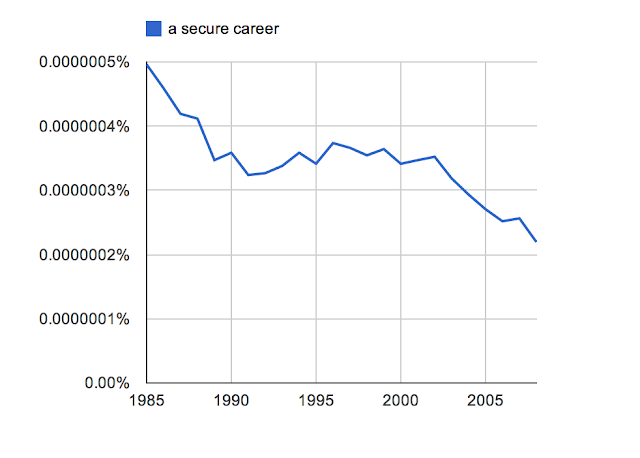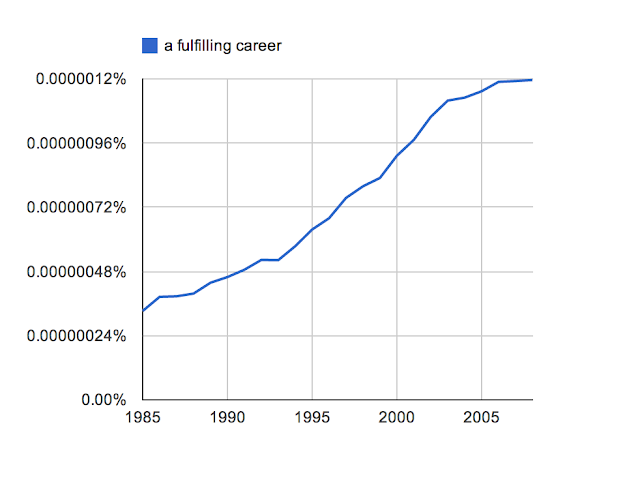Rise Above Apathy: Career Fulfillment Through Engagement
Upon the start of this new millennium, a major shift in culture and workplace norms has occurred. Economic factors, the wide-ranging effects of globalization, and a quickly evolving technological landscape have transformed everything from the type of work that we do to the way that we do it. The most surprising shift of all however, has been a change in why we do the work we do.
A few years ago, I stumbled on a blog by Tim Urban that broke down the generational evolution of the perception of happiness. Using Google’s Ngram Viewer, which shows the popularity of a phrase over different time periods, he measures the changes over time of two different phrases: “a secure career” and “a fulfilling career”:


The leading motivation influencing career paths is no longer job or financial security, it is now a matter of what would be most fulfilling. The old adage, “Choose a job you love, and you will never have to work a day in your life” has become an applied reality, disrupting the job market and workplace as we know it, shifting the control over to the employee, not the employer.
To adapt, proactive leaders have taken a distinct interest in the engagement and culture of their employees. There are countless resources available that address attracting the right people for the right positions to maximize the opportunity for self-actualization and overall fulfillment. Research backed studies have shown that managers account for 70% of variance in employee engagement, however, only about 10% of the population has a high level of talent for managing others and only 18% of current managers are a part of this group. If eight out of ten leaders are not inspiring loyalty and motivation, employees who are looking for a more fulfilling work experience should consider taking a more active role in developing and defining their own engagement.
To take charge in overcoming disengagement, establishing new habits and ways of thinking can be helpful:
- Look at the bigger picture. Instead of focusing on the individual task itself, think about how your piece fits in the puzzle. Every task and process is a part of a larger goal and when the task seems small or tedious, thinking about the impact you are making by doing what you are doing, and doing it well, can give you the extra push you need.
- Show appreciation and recognition of your colleagues. Looking for opportunities to praise the people you work with strengthens a sense of belonging that will further your day-to-day engagement. The benefits don’t stop there – making someone feel valued will also boost their engagement. As a bonus, appreciation is contagious; when people feel acknowledged they want to pass on that feeling and have others feel it as well. Yammer makes it easy to start spreading the love.
- Change up your routine. Getting caught in a rut is sometimes inevitable and can cause burnout and disengagement. If you are in a position with low autonomy, the effects are compounded. A change in routine can be refreshing and necessary to keep you going. If switching up where you stop for coffee or times you check your email doesn’t do the trick, take it up a notch. Focus on a process you feel caught in that has opportunities for improvement. Be vocal and communicate your ideas and work towards implementing positive changes.
- Reflect on your achievements. Accepting a compliment is tough for some – complimenting yourself is sometimes even more difficult. Though initially uncomfortable, taking a moment to acknowledge at least one thing per day you are proud of yourself for can make a significant impact. Whether you think it to yourself, write it down in a notebook or jot it down on a post it and stick it on your computer monitor, making a conscious effort to brag about yourself is an important key to raising your overall sense of achievement.
- Be accountable to yourself. Engagement is a personal choice. While leadership will always play a significant role in your job satisfaction, they are not the only responsible party. The reality is, you can have the best, most engaging and nurturing manager in the world and if you choose not to be engaged, you won’t be. No amount of positive reinforcement or team building exercises will change that. Make a conscious decision to be engaged and commit to it completely.



